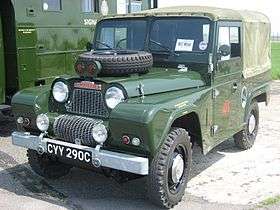Austin Gipsy
| Austin Gipsy | |
|---|---|
 | |
| Overview | |
| Manufacturer | Austin (BMC) |
| Production | 1958–1968 |
| Assembly |
United Kingdom New Zealand Sydney (Australia) Bogota (Colombia)[1] |
| Body and chassis | |
| Body style | Four-wheel drive |
| Powertrain | |
| Engine |
Austin (A70) OHV 62 hp (46 Kw) petrol diesel 2200cc 55 bhp (41 kW) |
| Dimensions | |
| Length | 139 in (3,531 mm) or 160 in (4,064 mm)[2] |
| Chronology | |
| Predecessor | Austin Champ |
The Austin Gipsy is an automobile which was produced by Austin from 1958 to 1968. It was designed as a replacement for the Austin Champ to compete with Rover's Land Rover.
History
Austin picked the name with an "I" spelling rather than gypsy. The Gipsy was visually similar to the Land Rover, but unlike the Land Rover, the Gipsy's bodywork was steel. The suspension was sophisticated, independent suspension all round using Flexitor rubber springs, which gave the Gipsy the ability to travel at high speeds over rough terrain. As an option, later models offered leaf springs on the front and rear.[3] It used a BMC 2199 cc petrol engine based on the one in the Austin A70; the compression ratio was 6.8:1, making the petrol-powered vehicle tolerant of low octane fuel.[3] A 2178 cc diesel-engined version was also offered.[3]
It was available initially in a 90-inch (2286 mm) (later known as the Short wheelbase (SWB) version to which was added a 111-inch (2819 mm) Long wheelbase (LWB) from Series II
With the merger of BMC with Leyland to form British Leyland the Austin Gipsy and the Land Rover were being produced by the same company. Production of the Gipsy was stopped after some 21,208 vehicles had been sold.[2]
See also
References
- ↑ Ian Walker, Rover down under…, www.aronline.co.uk Retrieved 21 June 2015
- 1 2 Robson, Graham (2006). A-Z British Cars 1945–1980. Devon, UK: Herridge & Sons. ISBN 0-9541063-9-3.
- 1 2 3 Howard, Geoffrey (18 May 1967). "Market Select: Another Look at the British Cars Tested Since Last Spring". Autocar. 126. (nbr 3718): 4–14.